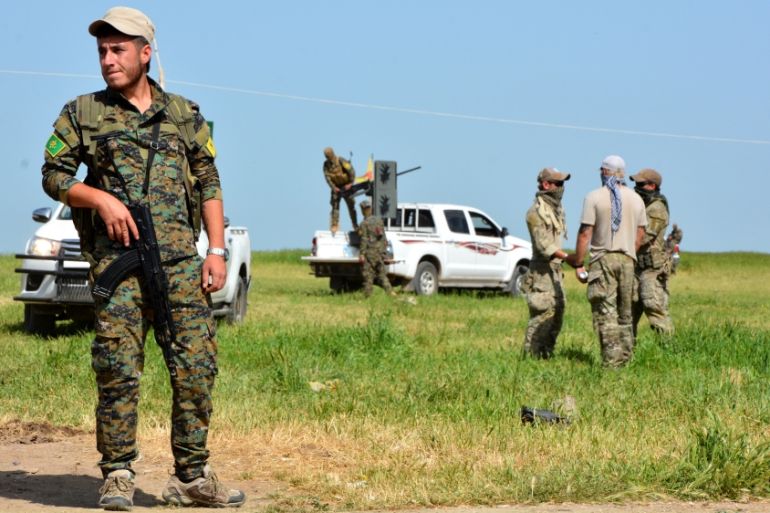Cavusoglu: US-Turkey ties may get ‘irreversibly harmed’
Foreign Minister Cavusoglu warns US counterpart Tillerson over moves to form a 30,000-strong army in the north of Syria.

Turkish Foreign Minister Mevlut Cavusoglu said relations between Turkey and the United States would be “irreversibly harmed” if Washington moves to form a 30,000-strong army in the north of Syria.
According to media reports, Washington is working to establish the border security force with the involvement of Kurdish militias, seen by Ankara as “terrorist” groups.
Keep reading
list of 4 itemsWorld Food Programme to end general assistance in northwest Syria
Erdogan open to meeting al-Assad but not to withdrawal from Syria
Middle East Roundup: What’s going on with Saudi Arabia and China?
Cavusoglu met US Secretary of State Rex Tillerson and Secretary of Defence James Mattis in the Canadian city of Vancouver on the sidelines of a meeting over sanctions on North Korea.
The Turkish foreign minister told reporters there late on Tuesday that he was advised by both secretaries not to believe media reports suggesting that the US intends to form the army in question.
The Pentagon acknowledged Turkey’s concern over its plans for the security force. “We have regular close communication with our NATO ally Turkey,” Pentagon spokesman Eric Pahon told Turkey’s Anadolu news agency.
Citing several other US officials, media reports published earlier this week said that the US-led coalition fighting the Islamic State of Iraq and the Levant (ISIL, also known as ISIS) armed group would recruit around half of the new force from the Syrian Democratic Forces (SDF), an umbrella group of fighters dominated by the Kurdish People’s Protection Units (YPG).
YPG is considered by Turkey to be a “terrorist group” with ties to the banned Kurdistan Workers’ Party (PKK), which has waged a decades-long fight inside the country. The US views the YPG as a highly effective fighting force against ISIL.
The PKK is outlawed in Turkey and considered a “terrorist” group by the EU and the US. More than 40,000 people in Turkey have been killed since the 1980s after the PKK launched its rebellion.
Turkish President Recep Tayyip Erdogan said on several occasions recently that Turkey’s armed forces had completed preparations for an operation against the Kurdish-controlled region of Afrin in northwest Syria.
He added that the operation would be carried out in cooperation with moderate Syrian rebels supported by Ankara.
Cavusoglu said in Vancouver that different opinions among the Pentagon and US Central Command, as well as different institutions and ministries in the US, over support for the SDF and the PYD/PKK have been causing the problem.
He said that Turkey may expand its operations after Afrin has been cleared.
“Turkey’s precautions against YPG/PKK cannot be limited to only Afrin. There is also Manbij and east of the Euphrates River,” Cavusoglu said.
Ankara reinforcing border
US President Donald Trump decided to arm YPG fighters despite Turkey’s objections and a direct appeal from Erdogan at a White House meeting in May 2017.
The US arms shipments began before the launch of a months-long offensive to remove ISIL from the Syrian city of Raqqa. The YPG played a prominent role in the eventual defeat of the group later in 2017.
Tensions between US and Turkey – two NATO allies – remain high, despite Trump saying last November that Washington would no longer supply weapons to the YPG.
Ankara has been reinforcing its southern border by sending armoured vehicles, tanks, and heavy machine guns, according to local media.
Turkey has been working closely with Russia and Iran to end the long-running Syrian war, despite Moscow and Tehran supporting Syrian President Bashar al-Assad – and Ankara backing the anti-Assad opposition.
Syria and Russia made statements in line with Turkey earlier in the week, opposing the reported US plans to establish a border force in the north of Syria.
In 2016, Turkey began a military campaign called Euphrates Shield Operation, which targeted ISIL and the YPG. That eight-month battle officially ended in March 2017.